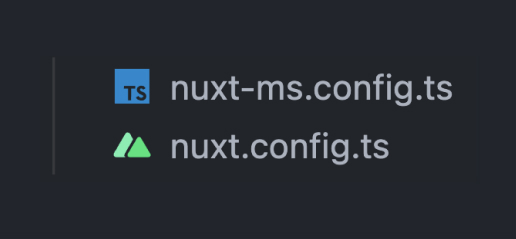Appearance
Nuxt Module Options #
To configure the integration, you can use nuxt-splitty property in the nuxt.config.ts:
import { defineNuxtConfig } from 'nuxt'
export default defineNuxtConfig({
modules: [
'nuxt-splitty'
],
nuxtMicroServices: {
/* module options */
},
})
import { defineNuxtConfig } from 'nuxt'
export default defineNuxtConfig({
modules: [
'nuxt-splitty'
],
nuxtMicroServices: {
/* module options */
},
})
WARNING
It's recommended to use the nuxt-splitty.config.ts file for module configuration to keep nuxt.config.ts clean. Put it the same directory as nuxt.config.ts.
Next examples show how to configure the integration with the nuxt-splitty.config.ts file.

nuxt-splitty.config.ts:
import { defineConfig } from 'nuxt-splitty'
export default defineConfig({
/* module options */
})
import { defineConfig } from 'nuxt-splitty'
export default defineConfig({
/* module options */
})
Options #
modules #
- Type:
Object - Default:
{
npm: [],
local: []
}
{
npm: [],
local: []
}
One of the most important options, which determines which modules are loaded in the project.
Supported options:
local- defines local modules, physically placed in the project,npm- defines external modules, hosted on the some registry. Npm or some private registry can be used.
import { defineConfig } from 'nuxt-splitty'
export default defineConfig({
modules: {
local: [
'core',
'@demo/user',
]
}
})
import { defineConfig } from 'nuxt-splitty'
export default defineConfig({
modules: {
local: [
'core',
'@demo/user',
]
}
})
modulesDir #
- Type:
String - Default:
modules
Local modules directory name.
vendorDir #
- Type:
String - Default:
vendor
Npm modules directory name. Directory is temporary and used by symbolic link.
nodeModulesDir #
- Type:
String - Default:
node_modules
Directory where installed npm modules are to be found.
i18n #
- Type:
Object - Default:
{ disabled: false, locales: [], }
Disable i18n support by setting disabled: true. Or set the locales to be used.
import { defineConfig } from 'nuxt-splitty'
export default defineConfig({
i18n: {
locales: [
'en',
'de',
]
}
})
import { defineConfig } from 'nuxt-splitty'
export default defineConfig({
i18n: {
locales: [
'en',
'de',
]
}
})
WARNING
All the nuxt-micro-services does for i18n is to collect all translations in the few json files. Read here for full setup.
pinia #
- Type:
Object - Default:
{ disabled: false, }
This option is used to enable pinia auto-import. You still need to install pinia manually. See pinia for more details.
theme #
- Type:
Object | null - Default:
{ name: 'default', themesDir: 'theme/themes', }
Set null to disable theme support.
More details later...
Example #
nuxt-splitty.config.ts:
import { defineConfig } from 'nuxt-splitty'
export default defineConfig({
modules: {
npm: [
'@scope/ui-module',
],
local: [
'core',
'cart',
],
},
i18n: {
locales: ['de', 'en'],
},
pinia: {
disabled: true,
},
theme: {
name: 'mdm',
},
})
import { defineConfig } from 'nuxt-splitty'
export default defineConfig({
modules: {
npm: [
'@scope/ui-module',
],
local: [
'core',
'cart',
],
},
i18n: {
locales: ['de', 'en'],
},
pinia: {
disabled: true,
},
theme: {
name: 'mdm',
},
})